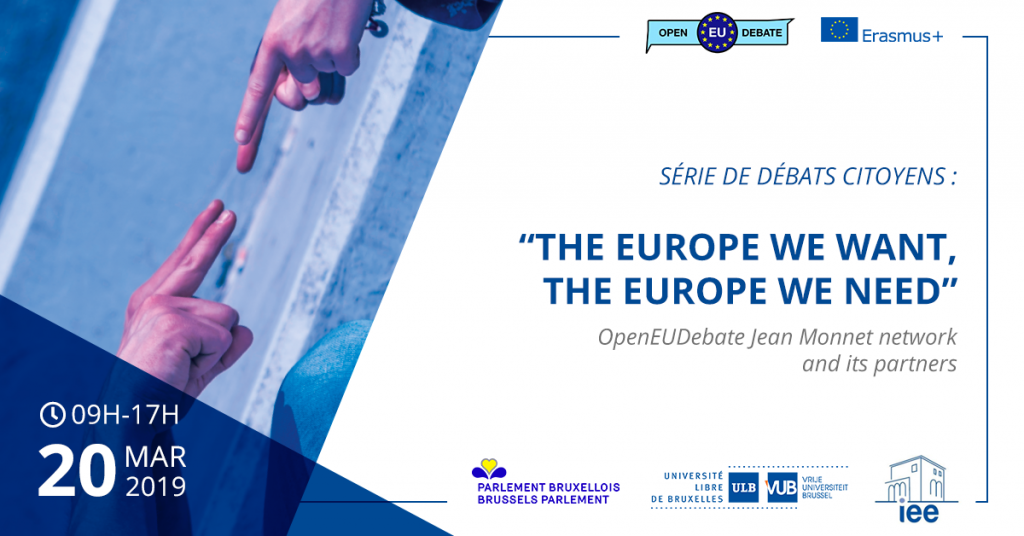Join us on March 20th at ULB (Place Flagey, 19 – 1050 Brussels) to share your visions of Europe!
Citizen debate
In May 2019, Europeans will vote their representatives for the next European Parliament (2019-2024).
Given the current state of the integration process and the challenges ahead, discussing the visions of our common future in Europe is more necessary than ever.
In this context, the OpenEUDebate Jean Monnet network and its partners (University Autónoma Madrid, Université libre de Bruxelles, Vrije Universiteit Brussel, Agenda Pública and the National School of Political Science and Public Administration in Bucharest) seek to create a forum for debating the future of the EU.
What citizens think about Europe matters. We believe the current debate on alternatives and reforms of the European integration project is weak and monopolised on the media by those who are able to raise their voices higher, hence losing the possibility of a real and constructive debate.
Our aim is to create a framework for deeper engagement to discuss the future of Europe in a meaningful way. We want to discuss issues that are timely, challenging and relevant for us European Citizens!
Practical information
When? March 20, 2019. Starting at 9:00 a.m.
Where? At the ULB (Place Flagey, 19)
Please check the full programme here.
Conference format:
- we invite citizens, civil society organisations and students from different EU member states to share collectively their visions of Europe;
- large groups of dialogue (in a format called ‘world café’*) will be organised during the conference; each group will bring 10 to 15 people to discuss;
- this collective brainstorm seeks to bridge the gap between real and perceived problems, local and European contexts and to generate innovative ideas about Europe
- three topics will be proposed for discussion
- European leadership: What is your message for the next president of the European Commission?
- European policies: What are the main problems of Europe today?
- European priorities: What should be the main priorities of the EU after 2019?
- participants will discuss each topic for 30 minutes. When time is up for the first topic, participants will move to another table to discuss the second topic; this movement is repeated until participants discussed the 3 topics proposed;
- in each group, the discussion will be moderated by an academic or a journalist, who will serve as rapporteur (summarizing the conclusions of each discussion group);
- the different discussions will be followed up by a concluding plenary to wrap-up the discussions and challenge the guest speakers
- working languages: French, Dutch, English, Spanish, Romanian, Italian (depending on the composition of the groups)
Online Survey:
An online survey will help us collect ideas in a bottom up process and allow those who are not able to attend the event to respond to the main topics proposed for discussion.
With this survey, we invite citizens and students from different EU member states to share their visions of Europe.
Do you want to share your ideas and express your concerns?
This event will be filmed and photos will be taken. They might be used for promotional activities related to the project. Please make sure to tell the organizer if you don’t want your image to be used.
*Description of the World café method:
The World Café can be used to tap into the collective knowledge of up to 30 participants on a topic of interest within 90 minutes. The method creates space for one group to explore a question or issue (within an overall topic), then invites a second and subsequently a third group to come in and provide additional insights, offer critiques and build further on the knowledge captured. The quality of experiences shared, and knowledge gathered is rich and obtained in a relatively short space of time. (Source: UNICEF)

